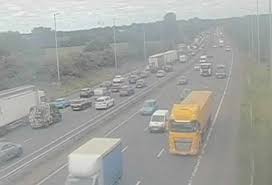Navigating Through M6 Road Closures: Challenges and Solutions

The Impact of M6 Road Closures on Commuters and Businesses
The M6 motorway, one of the busiest and most vital routes in the UK, has been experiencing frequent road closures recently, causing significant disruptions to commuters and businesses alike. These closures are often necessary for maintenance, repairs, or major construction works to ensure the safety and efficiency of the motorway.
Commute Nightmares
For many commuters who rely on the M6 to get to work or travel between cities, road closures can turn their daily commute into a nightmare. Diversions and traffic congestion lead to longer travel times, increased stress levels, and potential delays in reaching their destinations.
Business Challenges
Businesses that depend on the smooth flow of traffic along the M6 also feel the impact of road closures. Delivery schedules may be disrupted, leading to delays in receiving supplies or getting products to customers on time. Increased transportation costs and reduced productivity can further strain businesses already facing challenges.
Planning Ahead
While road closures on the M6 are inevitable for essential maintenance and improvements, proper planning and communication can help mitigate their effects. Providing advance notice of closures, offering alternative routes, and coordinating works during off-peak hours can help minimise disruptions for commuters and businesses.
Community Support
It is crucial for authorities responsible for managing the M6 motorway to engage with local communities and stakeholders affected by road closures. Transparency about the reasons for closures, regular updates on progress, and listening to feedback from those impacted can foster understanding and cooperation during these challenging times.
Looking Ahead
As efforts continue to maintain and improve the M6 motorway infrastructure, it is essential to balance the need for road closures with minimising disruptions for commuters and businesses. By working together towards efficient planning, clear communication, and community support, we can navigate through road closures on the M6 with greater resilience and understanding.
Top 6 Tips for Navigating M6 Road Closures
- Plan your journey in advance and check for any scheduled road closures on the M6.
- Stay updated with local traffic news to avoid any unexpected delays due to road closures.
- Consider alternative routes or modes of transport if major closures are expected on the M6.
- Allow extra travel time in case you encounter diversions or slower traffic flow near closure points.
- Follow official diversion signs and instructions provided by authorities during road closures on the M6.
- Be patient and drive carefully, especially when navigating through areas affected by road closures.
Plan your journey in advance and check for any scheduled road closures on the M6.
To minimise disruptions and ensure a smoother travel experience, it is advisable to plan your journey in advance and check for any scheduled road closures on the M6. By staying informed about potential closures, you can explore alternative routes, adjust your travel time accordingly, and avoid unexpected delays. Planning ahead allows you to navigate around potential obstacles more efficiently, making your commute or journey along the M6 more predictable and stress-free.
Stay updated with local traffic news to avoid any unexpected delays due to road closures.
Stay updated with local traffic news to avoid any unexpected delays due to road closures on the M6 motorway. Keeping informed about upcoming closures, diversions, and alternative routes can help you plan your journey effectively and minimise disruptions to your travel schedule. By staying ahead of the latest traffic updates, you can navigate through potential road closures with greater ease and ensure a smoother commute or journey along the M6.
Consider alternative routes or modes of transport if major closures are expected on the M6.
When major closures are anticipated on the M6 motorway, it is advisable to explore alternative routes or modes of transport to mitigate potential disruptions to your journey. Considering options such as alternative highways, public transportation, or carpooling can help you avoid delays and congestion caused by road closures on the M6. Planning ahead and being flexible with your travel arrangements can ensure a smoother and more efficient commute during periods of expected major closures on this vital transport route.
Allow extra travel time in case you encounter diversions or slower traffic flow near closure points.
When navigating through M6 road closures, it is advisable to allocate additional travel time to accommodate potential diversions or slower traffic flow near closure points. By allowing extra time for your journey, you can better cope with unexpected delays and ensure a smoother and less stressful commute. This proactive approach helps you stay prepared for any disruptions caused by road closures, enabling you to reach your destination safely and on time.
Follow official diversion signs and instructions provided by authorities during road closures on the M6.
During road closures on the M6, it is crucial to adhere to official diversion signs and follow instructions provided by authorities. These signs and instructions are put in place to ensure the safety of all road users and to help maintain a smooth flow of traffic during diversions. By following the designated routes and guidance from authorities, drivers can navigate through the closures more efficiently and safely, reducing the risk of accidents and delays for themselves and others on the road.
Be patient and drive carefully, especially when navigating through areas affected by road closures.
It is crucial to exercise patience and drive with extra care, particularly when navigating through sections impacted by M6 road closures. Being patient allows for safe maneuvering through diversions and traffic congestion, reducing the risk of accidents and ensuring the safety of both yourself and other road users. By driving carefully and attentively in these challenging conditions, you contribute to smoother traffic flow and help minimise disruptions caused by the closures.
